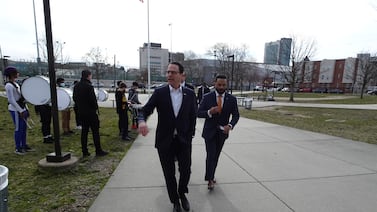On the surface, the bill had a simple premise — to recognize Colorado universities and colleges that enroll a high number of students who are the first in their family to go to college and communicate to those students that they are welcome on campus.
The mostly symbolic bill, however, prompted a more complicated conversation about whether creating a first generation-serving designation would lead to those schools getting more state funding. In a state that funds its public colleges near the bottom of the nation, any hint at changing the distribution of money raises concerns for university leaders.
Faced with opposition from larger schools that serve fewer first-generation students, the sponsors pulled House Bill 1114 before it went to vote on the House floor.
Bill co-sponsor state Rep. Rick Taggart, a Grand Junction Republican, said he wants to talk more with university leaders and bring the bill back next year. He said it troubled him that the opposition centered on funding concerns when the bill didn’t call for any changes to the higher education funding formula. At the same time, he said he understands why money is a sensitive subject.
“I totally respect the reason that folks are really concerned about the funding formula is that higher education is way underfunded in this state, just severely underfunded,” Taggart said. “If you start messing with the formula, you’re going to rob Peter to pay Paul.”
For university leaders, the bill did place funding under the microscope.
Supporters such as Colorado Mesa University President John Marshall said he hoped the designation would kick off a larger conversation about the money schools need to educate first-generation students who often need more support. Colorado Mesa University and Metropolitan State University of Denver supported the bill and would have almost immediately earned the first generation-serving designation.
In a statement, MSU Denver President Janine Davidson said the school was proud to stand behind the bill.
“While we’re disappointed it didn’t pass, we remain committed to making MSU Denver a vibrant home for those trailblazing students who are the first in their families to go to college,” she said.
Opponents such as Colorado State University System Chancellor Tony Frank said during committee testimony that other schools also serve students who are the first in their family to go to college in their family. He worried that the designation would create unfair considerations later on. A CSU System spokeswoman did not return a request for comment.
The bill passed the House Education Committee unanimously last month, but Taggart and co-sponsor state Rep. Serena Gonzales-Guttierez, a Denver Democrat, pulled the bill from consideration before a full House vote last week.
Taggart said schools should get recognized for what they do for students, and students should know about their options. For example, schools whose student populations are 25% Hispanic or more are designated Hispanic-Serving Institutions. However, that federal designation does come with extra money. Other schools or programs might get special designations for what they’ve accomplished, Taggart said.
Taggart hopes he can find more agreement when he brings the bill back next year. Educating first-generation students will be a big part of how Colorado gets a more educated population, he said.
“I am disappointed because this evolved into a funding discussion rather than sticking to a designation that these universities deserve,” Taggart said.
Jason Gonzales is a reporter covering higher education and the Colorado legislature. Chalkbeat Colorado partners with Open Campus on higher education coverage. Contact Jason at jgonzales@chalkbeat.org.







